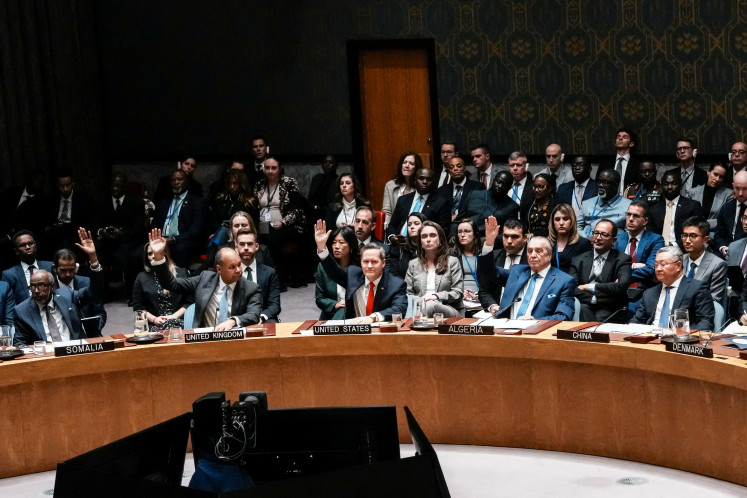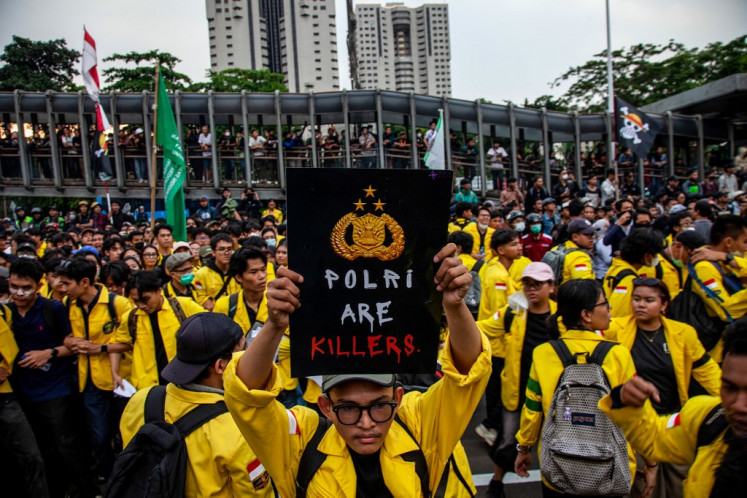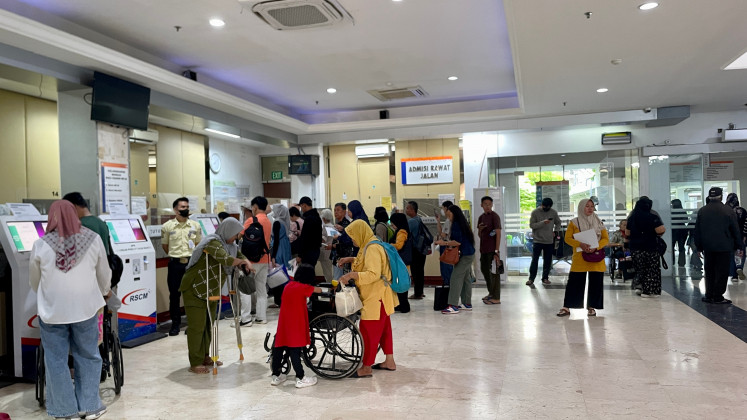Popular Reads
Top Results
Can't find what you're looking for?
View all search resultsPopular Reads
Top Results
Can't find what you're looking for?
View all search resultsPost-Reynhard anti-LGBT sentiment condemned
It never crossed Ayu Bagaoesoekawatie’s mind that crimes committed in Manchester, the United Kingdom, a place thousands of kilometers away, would directly have an impact on him
Change text size
Gift Premium Articles
to Anyone
I
t never crossed Ayu Bagaoesoekawatie’s mind that crimes committed in Manchester, the United Kingdom, a place thousands of kilometers away, would directly have an impact on him.
Bagoes, a 28-year-old gay man in Jakarta, has had to face the reality that the crimes by Reynhard Sinaga, another Indonesian gay man, have affected him.
Following the conviction of Reynhard for serial rapes, Bagoes, who is open about his identity, said his friends have started to liken him to the rapist or made comments with anti-lesbian, gay, bisexual and transgender (LGBT) sentiments.
“A friend said to me that [LGBT people] had to be guided and banished,” Bagoes told The Jakarta Post.
Reynhard, a 36-year-old Indonesian citizen was sentenced to life for 136 counts of rape, eight counts of attempted rape, 13 counts of sexual assault and two counts of sexual assault with penetration in Manchester. The case caused a furor and sent shock waves across the country.
The LGBT community and some civil society groups have expressed concerns that the public are linking the crimes to Reynhard’s sexual orientation. Given the comments that have been made regarding the Reynhard case, Bagoes was concerned a backlash against the LGBT community would grow just like in 2017 when police raided a gym in Kelapa Gading, North Jakarta, where a gay sex party was reportedly taking place.
In anticipation of negative sentiment against the LGBT community, a day after Reynhard’s conviction made headlines, a coalition of civil society organizations against sexual violence, comprising 16 organizations, issued a statement on Jan. 7 asking for the public to refrain from linking the crimes to any sexual orientation.
“Blaming someone’s criminal acts on their sexual orientation is an attempt to turn this sexual violence issue into hatred of the vulnerable LGBT community,” the statement read.
The following day, however, the mayor of Depok in West Java, where Reynhard’s parents reportedly live, did just that. Mayor Muhammad Idris Abdul Somad said he had requested that his administration heighten efforts to prevent the “spread of LGBT” in order to “strengthen families’ resilience and especially protect the children”, including by being more active in carrying out raids on rooming houses and apartments.
“The relevant officials can also form crisis centers in Depok specifically for LGBT victims, as well as approach related institutions to work together in educating the people, especially the people who are pro-LGBT in the name of human rights,” he said at Depok town hall on Jan. 8, as quoted on his official website.
This was not the first time Idris displayed anti-LGBT sentiment. In 2018, he announced that the administration had established an anti-LGBT team and was planning to draft anti-LGBT regulations. Idris, a Prosperous Justice Party politician, was not alone in doing so.
A 2019 report by LGBT rights organization Arus Pelangi showed that between January and February 2018, 45 statements containing hate speech against the LGBT community were expressed by executive and legislative officials, law enforcers and public figures.
Scores of Depok residents staged a rally on Wednesday supporting Idris’ calls for anti-LGBT raids, urging the Depok Legislative Council to pass an anti-LGBT bylaw, tribunnews.com reported.
Dede Oetomo, founder and activist of GAYa Nusantara, Indonesia’s oldest LGBT group, said such responses could inflict fear among vulnerable members of the community. However, he did not find it surprising that authorities would resort to such generalizations as it had been done before, including during the case of Verry “Ryan” Idam Hermansyah, who was convicted of killing 11 men in Jombang, East Java, in 2008.
Such open anti-LGBT sentiment from officials could further justify people’s irrationality in regard to the case and also their hatred against the community, especially as Indonesia has yet to embrace education on sexuality in formal settings, he argued.
Meanwhile, media observers also raised concerns that coverage of the Reynhard case not only put the blame on his sexual orientation, but also further created misconceptions surrounding the LGBT community.
Given these conditions, Amnesty International Indonesia called on authorities to end raids targeting LGBT and intersex (LGBTI) people, highlighting that this was not the first time Indonesian authorities had launched “humiliating crackdowns” on suspected same-sex activity and misused laws against loitering or public nuisance to harass and arrest LGBTI people.
The Arus Pelangi report noted that there were 27 cases of expulsion, ranging from families, village residents and officials to law enforcers along with religious groups between 2006 and 2017. Hundreds of other persecution cases in various forms were also recorded in the report.
The National Commission on Human Rights meanwhile also issued a statement asking Idris to revoke his calls, regarding them as violations of the Constitution and international conventions on civil and political rights.










